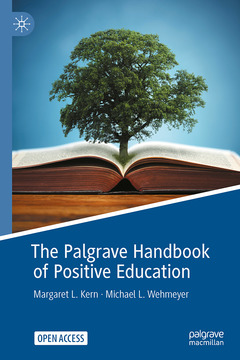The Palgrave Handbook of Positive Education, 1st ed. 2021

This open access handbook provides a comprehensive overview of the growing field of positive education, featuring a broad range of theoretical, applied, and practice-focused chapters from leading international experts. It demonstrates how positive education offers an approach to understanding learning that blends academic study with life skills such as self-awareness, emotion regulation, healthy mindsets, mindfulness, and positive habits, grounded in the science of wellbeing, to promote character development, optimal functioning, engagement in learning, and resilience.
The handbook offers an in-depth understanding and critical consideration of the relevance of positive psychology to education, which encompasses its theoretical foundations, the empirical findings, and the existing educational applications and interventions. The contributors situate wellbeing science within the broader framework of education, considering its implications for teacher training, educationand developmental psychology, school administration, policy making, pedagogy and curriculum studies.
This landmark collection will appeal to researchers and practitioners working in positive psychology, educational and school psychology, developmental psychology, education, counselling, social work and public policy.
Margaret (Peggy) L. Kern is Associate Professor at the Centre for Positive Psychology at the University of Melbourne’s Graduate School of Education, Australia. Dr Kern is Founding Chair of the Education Division of the International Positive Psychology Association (IPPA). You can find out more about Dr Kern’s work at www.peggykern.org.
Michael L. Wehmeyer is Ross and Mariana Beach Distinguished Professor of Special Education; Chair of the Department of Special Education; and Director and Senior Scientist, Beach Center on Disability, at the University of Kansas, United States. Dr Wehmeyer is Publications Lead for theEducation Division of the International Positive Psychology Association (IPPA). He has published more than 450 peer-reviewed journal articles and book chapters and is an author or editor on 42 texts.
Date de parution : 06-2021
Ouvrage de 777 p.
15.5x23.5 cm
Thèmes de The Palgrave Handbook of Positive Education :
Mots-clés :
Open Access; Positive Education; Resilience; Social and Emotional Learning; Mindfulness in education; Positive Emotions; Playfulness; Emotional Development; Character Strengths Interventions; Trauma-informed Approaches; Positive Youth Development; Systems Informed Positive psychology; Strength-based Reflective Practice; Flourishing; Creative Learning; Positive Spirituality; Whole Child Approach to Education; Teacher and Staff Wellbeing; Positive Organizational Scholarship; Social Work and Community Development



